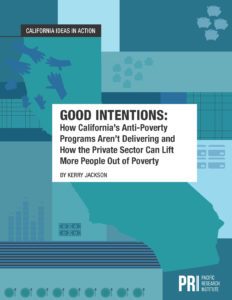 By Kerry Jackson, Fellow, Pacific Research Institute Center for California Reform
By Kerry Jackson, Fellow, Pacific Research Institute Center for California Reform
California policymakers should reform government anti-poverty programs to remove incentives against work while expanding job opportunities in the state’s poorest communities, according to a new issue brief released today by the non-partisan California-based think tank, the Pacific Research Institute.
Click here to download a copy of “Good Intentions: How California’s Anti-Poverty Programs Aren’t Delivering and How the Private Sector Can Lift More People Out of Poverty.”
“When Americans think about poverty, they think of the destitution and despair of Appalachia. Shockingly, wealthy California has serious poverty problem, with 8 million people – and nearly one in five children – living in poverty,” said Kerry Jackson, author of the brief and fellow with PRI’s Center for California Reform. “Poverty is a statewide tragedy that should be a top priority for California policymakers in 2018. This important issue brief evaluates state anti-poverty programs, offers recommendations for reform, and profiles private charities and nonprofits that are making a difference in lifting people out of poverty.”
Click here to listen to this week’s episode of PRI’s podcast, featuring an interview on California’s poverty crisis with Michele Steeb, CEO of St. John’s Program for Real Change in Sacramento.
Among the findings of “Good Intentions”:
- Causes of California’s unacceptably-high poverty rate include the perverse incentives of government anti-poverty programs that dis-incentivize work, the state’s ongoing housing crisis, and anti-business climate.
- Lawmakers should look to examples of successful reforms in Wisconsin, Virginia, Michigan, and other states as they evaluate and consider much-needed reforms to California’s current government programs to improve effectiveness and reduce taxpayer costs.
- Programs like St. John’s Program for Real Change in Sacramento, Solutions for Change in Vista, Working Wardrobes in Orange County, and Father Joe’s Villages in San Diego are examples of real-life private charities that policymakers should consider replicating across the state.
- One of the most critical things lawmakers can do to reduce poverty is encourage more job opportunities and economic growth statewide, especially in poor communities.
Kerry Jackson is an independent journalist and opinion writer with extensive experience covering politics and public policy. As a fellow with PRI’s Center for California Reform, he writes weekly op-eds and blog posts on statewide issues and occasional policy papers for PRI. In 2017, he wrote Unaffordable, an issue brief exploring California’s housing crisis which won bipartisan praise.

Leave a Reply